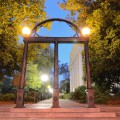 A new peer-reviewed article authored by Dawn Iacobucci and published in the Journal of Marketing Education finds that business school rankings appear to be reliable, despite criticism levied at college ranking systems over the years by administrators at high-profile universities.
A new peer-reviewed article authored by Dawn Iacobucci and published in the Journal of Marketing Education finds that business school rankings appear to be reliable, despite criticism levied at college ranking systems over the years by administrators at high-profile universities.
Among those that Professor Iacobucci assessed, U.S. News & World Report’s Best Business Schools was deemed both reliable and valid. Professor Iacobucci is the E. Bronson Ingram Professor of Management in Marketing at Vanderbilt University in Tennessee.
Iacobucci conducted the psychometric analysis of three major business school ranking publications: US News & World Report, the Financial Times, and Businessweek. Psychometric analysis is a technique used to determine the validity of surveys, tests and assessments.
In this case, Professor Iacubucci applied psychometric techniques to each of the publisher’s surveys used to determine school rankings. No business school rankings can act as a crystal ball predicting students’ future happiness and earnings, but among the guides, U.S. News & World Report’s methodology consistently came out ahead when assessed for reliability and validity in Professor Iacobucci’s study.
For the past 25 years, prospective business school students have turned to the various ranking publications to assess business schools. Each publication, according to the article, has its strengths and weaknesses. While U.S. News & World Report was seen as the most reliable guide to capturing student quality via GMAT scores, Businessweek adequately assesses whether students are happy at their chosen institution, while Financial Times captures the return on investment.
Iacobucci recommended that the other publications follow U.S. News & World Report’s lead and publish GMAT scores in addition to rank, as well. She suggested that all publications include a confidence interval with their results to remind readers of the potential margin of error inherent in any poll or study. Confidence intervals are used in statistics to help those reviewing the numbers understand the potential range of error in the study.
Despite the popularity among students and parents for the various school ranking guides, some college leaders have criticized the guides as incomplete and misleading. In a report entitled “College Rankings: History, Criticism and Reform,” authors Luke Myers and Jonathan Robe of the Center for College Affordability and Productivity quote Gerhard Casper, the former President of Stanford University, as critical of the accuracy and methodology of many ranking systems. The new study by Professor Iacobucci assuages many of the criticisms levied at their reporting method by taking an unbiased and thorough look at the study instruments used to collect data.






No Comment